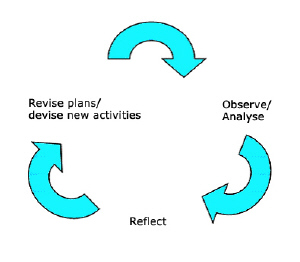- Why does monitoring receive special attention?
- What is reflexive monitoring?
- How is reflexive monitoring different?
- What are, in general, the objectives of monitoring and evaluation?
- Can learning be combined with accountability?
- Why is participation important?
- What is the role of the reflexive monitor?
- What are the monitorís tasks?
- Is an external monitor necessary?
- What do I monitor or evaluate?
What is reflexive monitoring?
Reflexive monitoring is:
- a participative process of gaining an insight into the progress of the project or programme
- that also provides insight into the intended and unintended effects of the project or programme, in relation to and interaction with the environment and including the structural and regime aspects
- plus (critical) reflection on that regime and the personal points of departure and deeper convictions and values
- and translating the findings back into the design of the project or programme or any follow-up activities in order to preserve the ambitions for system innovation
Three types of activity
Reflexive monitoring involves a series of activities: observation and analysis, reflection and adjustment and/or future development (see also figure below).

Observation and analysis
This could include observation and analysis of:
- Group processes: networks and interactions within networks
- Physical and socio-technical systems and their internal relationships
- Effects of the project or programme on networks and interactions and on physical systems
- Landscape developments
- The regime and obstacles in it
- Other interesting niche experiments
For methods of observation and analysis, see also the database ‘Methods'.
Reflection
What follows is a critical reflection on the observations and analyses. Essential questions include:
- What are the implications of the observations and analyses for the ambitions for system innovation and the aim and strategy of the project or programme?
- Which developments can your project or programme take advantage of?
- Which developments could strengthen your project or programme?
- Are structural obstacles inevitable or could the structure be modernised in a creative manner?
This process calls for participants to reflect critically on their own (theoretical) principles, deeper convictions, values (the obvious ‘mental models'). This is particularly important when one is encountering barriers to the system innovation. See also ‘About transitions'.
Adaptation
The reflection process may make it necessary to revise the objectives, target groups, strategies or activities of the project or programme. It might also lead to the development of follow-up projects or programmes.
Examples
Methods
- Most significant change method
- Collective system analysis
- Dynamic learning agenda
- Theory of Change
- Reflexive Interactive Design (RIO)
- Reflexive process monitoring (RPM)
- Reflexive programme monitoring
- Socratic intervision method
- Actor, network or stakeholder analyses
- Learning history, Timeline method